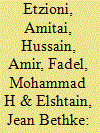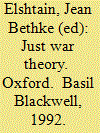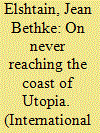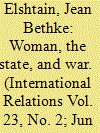|
|
|
Sort Order |
|
|
|
Items / Page
|
|
|
|
|
|
|
| Srl | Item |
| 1 |
ID:
081488


|
|
|
|
|
| Publication |
2008.
|
| Summary/Abstract |
The following is an exchange concerning the concept of 'illiberal moderates' and its implications for a new global architecture as well as for a worldview that sees the evolution of a global core of shared values which favour domestic and international security, in sharp contrast to the 'clash of civilizations' thesis. The original statement was published in the Cambridge Review of International Affairs (Etzioni 2006). A more extensive treatment can be found in Part III of Security first: for a muscular, moral foreign policy (Etzioni 2007b), which examines texts of four religious and two secular belief systems as well as review of relevant public opinion polls and 'traveller notes'. Here follows a brief summary of the main thesis, followed by comments from prominent scholars and Etzioni's response to these comments.
|
|
|
|
|
|
|
|
|
|
|
|
|
|
|
|
| 2 |
ID:
002273


|
|
|
|
|
| Publication |
Oxford, Basil Blackwell, 1992.
|
| Description |
x, 336p.
|
| Series |
Readings in social and political theory
|
| Standard Number |
0631172785
|
|
|
|
|
|
|
|
|
|
|
|
Copies: C:1/I:0,R:0,Q:0
Circulation
| Accession# | Call# | Current Location | Status | Policy | Location |
| 033560 | 355.021/ELS 033560 | Main | On Shelf | General | |
|
|
|
|
| 3 |
ID:
082743


|
|
|
|
|
| Publication |
2008.
|
| Summary/Abstract |
Elshtain argues that the realist-idealist divide serves no useful heuristic or even polemical purpose. Beginning with Tom Stoppard's acclaimed trilogy, The Coast of Utopia, Elshtain unpacks utopian arguments of recent vintage, showing their distinctive features. She goes on to display the utopistic/idealist `moments' in the work of self-described `realist' E. H. Carr as part of a critical re-examination of Carr's work. The article continues with an appreciative assessment of Martin Wight, concluding that his `idealism' is far more `realistic' than are the arguments of many `realists'. The article's concluding section makes the case for Augustinian realism
|
|
|
|
|
|
|
|
|
|
|
|
|
|
|
|
| 4 |
ID:
090150


|
|
|
|
|
| Publication |
2009.
|
| Summary/Abstract |
Does `gender' as a category of analysis or as a central feature of a logic of explanation alter in significant ways Kenneth Waltz's famous `levels of analysis' as developed in his classic, Man, the State, and War? One overriding claim of feminist international relations has been that `gender' alters all levels of analysis; thus, changing `man' to `woman' in the formulation `man, the state, and war' significantly transforms our understanding of international relations. I evaluate this claim critically by assessing the adequacy of feminist formulations on each of Waltz's levels of analysis and, further, by unpacking Waltz's own understanding of these levels. I conclude that Waltz remains enormously helpful in deconstructing reductionist accounts, especially on the `first level' of analysis, but that his own account is problematic insofar as it insists on a `structural analysis' sundered from his levels 1 and 2, namely, wars flow from human nature or, alternatively, from the domestic ordering of states. I point out that Waltz himself leaves some `wiggle room' in his book that permits one to `plug in' features of the first two levels of analysis that are critical to understanding the structural level. In other words, all three levels must be in play if one is to craft a compelling explanatory framework.
|
|
|
|
|
|
|
|
|
|
|
|
|
|
|
|
|
|
|
|
|